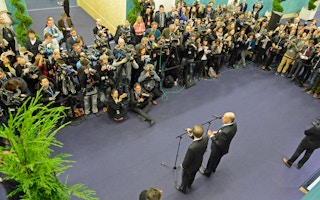Another annual climate change conference has just come to an end. This is the second since the landmark Paris Agreement, the thirteenth since the ratification of the Kyoto Protocol and the twenty third since the signing of its parent agreement, the United Nations Framework Convention on Climate Change.
To continue reading, subscribe to Eco‑Business.
There's something for everyone. We offer a range of subscription plans.
- Access our stories and receive our Insights Weekly newsletter with the free EB Member plan.
- Unlock unlimited access to our content and archive with EB Circle.
- Publish your content with EB Premium.
There have been even more meetings of the bodies pertaining to each of these agreements, so the list is actually longer. Yet, it felt like we were on to somewhere, as opposed to being on the road on to nowhere – the possibility of which is quite high when it comes to international climate negotiations.
Angela Merkel declared that climate change was an issue “determining our destiny as mankind”, yet acknowledged that Germany was likely to miss its 2020 target. China, on the other hand, is expected to launch its emissions trading scheme with a cap of 4 billion tonnes, twice the size of the European Union’s famous Emissions Trading Scheme – and when that happens, it will change the nature of the carbon pricing discussion, currently considered the purview of the European Union.
India and China led the developing countries’ position insisting that a stock-take of actions before 2020 be done, pushing developed countries to live up to their promises. It was a grand event for statements and urgings.
What is clear is that action on climate change does not take place at international conferences – which is different from the time of Kyoto Protocol negotiations where countries came to the table to negotiate, a process that led to the agreement on an emissions cap. Actions are largely addressed back home, in ways that make sense for countries’ economic development needs.
Ms Merkel’s speech, President Macron’s urging of countries to accelerate their implementation of the Paris Agreement are simply examples of what the annual UN conference has become – an international peer pressure platform. And this is despite the United States’ only official event discussing the merits of coal and nuclear power (at which the audience heckled and staged a walk out).
The unsaid understanding is that the world is nowhere near achieving the 2 degree Celsius stabilization target it vowed so ambitiously to achieve in the Paris Agreement. According to the IEA, even with every country’s national climate action commitments, global temperatures could rise by 4 degrees Celsius.
“
Yet, it felt like we were on to somewhere, as opposed to being on the road on to nowhere – the possibility of which is quite high when it comes to international climate negotiations.
Perhaps the Paris target of 2C is not achievable anyway – back in 2005, the World Business Council for Sustainable Development (WBCSD) envisioned this scenario as having to switch off all coal plants by 2020, a scenario that is clearly unrealistic even today.
This COP was therefore a process COP, not expected to produce firm commitments, but still important in the grand scheme of things and its role as a peer pressure - and convening - platform. This COP was about making progress on the rules that will guide the implementation of the Paris Agreement, and which it did and made reasonable progress. Rules are to be agreed on by December 2018.
The most significant process marker was developing countries’ insistence that space be made to discuss progress of developed countries action towards the 2020 commitments. The final decision text has an entire section on ‘pre-2020 implementation and action’, reflecting its relative importance.
The issue of finance, which has traditionally been on the COP agenda and emphasized at the Paris discussions, was deliberately not on the official agenda this time – to dedicate time for rules & procedures instead.
Yet, private parties organized three full Finance Days at a venue outside the conference center, that saw participation from pension funds, equity and investment houses to the usual multilateral development banks. More than a thousand people had registered for this. There is clearly a rapidly emerging interest in this area.
While this COP didn’t produce firm commitments, a number of smaller ‘announcements’ were made at the global platform, such as a partnership of US$125 million to bring affordable insurance to the most vulnerable people in the world; a partnership to encourage more action on oceanic matters and climate change; emerging of the International Solar Alliance as a real entity and several other smaller but equally important initiatives.
So, the global platform has a place in today’s world – to make announcements, convene people and organizations from the developed and developing worlds alike, and keep the process alive as we inch forward towards a global understanding on the much-needed implementation elements of the Paris Agreement.
Mahua Acharya is Assistant Director-General with the Global Green Growth Institute, an intergovernmental body headquartered in Seoul, South Korea. Views are her own. This article was written exclusively for Eco-Business.











